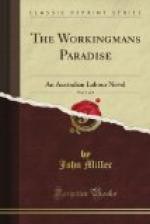Suddenly Mrs. Stratton stood up. “Geisner!” she cried. “I’m ashamed of you. You hear us getting overwhelmed by these English heresies, and you don’t come to the rescue. We have talked ourselves dry and you haven’t said a word. Who says wine?”
Geisner slowly put down his book and went to the piano. “This is the only argument worth the name,” he said. He ran his fingers over the keys, struck two or three chords apparently at hap-hazard, then sat down to play. A volume of sound rose, of clashing notes in fierce, swinging movement, a thrilling clamour of soul-stirring melody, at once short and sharp and long-drawn, at once soft as a mother’s lullaby and savage as a hungry tiger’s roar. It was the song of the world, the Marseillaise, the song that rises in every land when the oppressed rise against the oppressor, the song that breathes of wrongs to be revenged and of liberty to be won, of flying foes in front and a free people marching, and of blood shed like water for the idea that makes all nations kin. The hand of a master struck the keys and brought the notes out, clear and rhythmic, full strong notes that made the blood boil and the senses swim.
As the glorious melody rose and fell, sinking to a murmur, swelling out in heroic strains that rang like trumpet pealings, a great lump rose in Ned’s throat and a mist of unquenchable tears filled his eyes. Roget de Lisle, dead and dust for generations, rose from the silent grave and spoke to him, spoke as heart speaks to heart, spoke and called and lived and breathed and was there, spoke of tortured lives and enslaved millions and of the fetid streets of great towns and of the slower anguish of the plundered country side, spoke of an Old Order based on the robbery of those who labour and on their weakness and on their ignorant sloth, spoke of virtue trampled down and little children weeping and Humanity bleeding at every pore and womanhood shamed and motherhood made a curse, spoke of all he hated and all he loved, pilloried the Wrong in front of him and bade him—to arms, to arms. “To arms!” with the patriot army whose trampling was the background of the music. “To arms!” with those whose desperate hands feared nothing and at whose coming thrones melted and kingdoms vanished and tyranny fled. To arms! To certain victory! To crash forward like a flood and sweep before the armed people all those who had worked it wrong!
Down Ned’s cheeks the great tears rolled. He did not heed them. Why did not some one beat this mighty music through the Sydney slums, through those hateful back streets, through those long endless rows of mortgaged cottages and crowded apartment-houses? Why was it not carried out to the great West, hymned from shed to shed, told of in the huts and by the waterholes, given to the diggers in the great claims, to the drovers travelling stock, borne wherever a man was to be found who had a wrong to right and a long account to square? Ah! How they would




